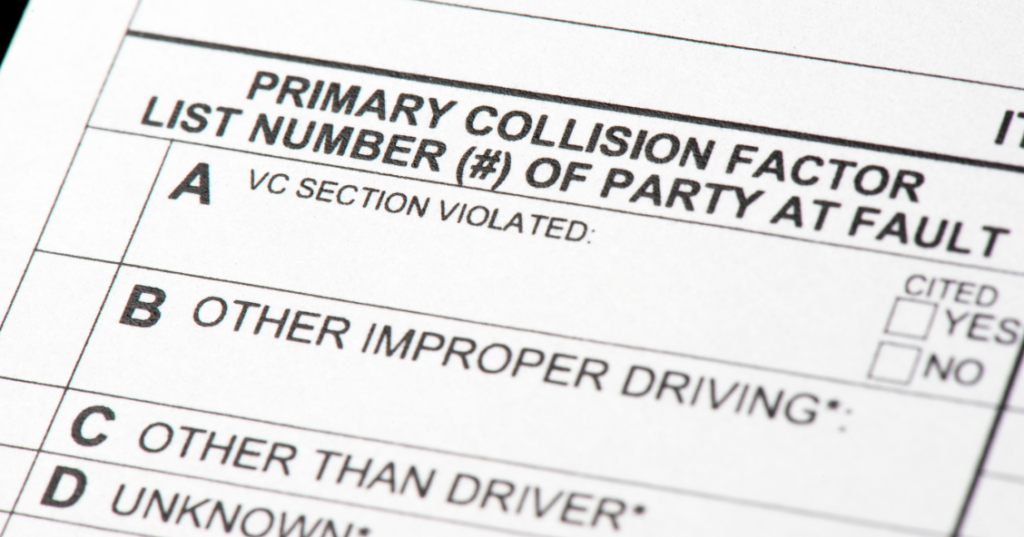When you are involved in a car accident, you can typically assume that it was the result of an error on the part of one or more drivers. An accident is just that: accidental. Almost no one leaves their house with the intention of being involved or causing a vehicle collision. When a driver is distracted, is speeding because they are late, or makes other poor judgments, accidents can occur. When you think about it, it is very easy to see how mistakes can lead to collisions. But what happens when you disagree with a police report? What can you do if you are faced with the possibility that an officer, who hold authority in the court system, has made a statement or created a car accident report that you do not agree with?
You may feel almost helpless, but don’t worry just yet. There are a lot of meaningful ways to deal with a police report you disagree with that are non-confrontational and may just get the job done.
Errors Are More Common Than You May Think

This happens more often than you may think or even believe, and many personal injury attorney clients will disagree with a police report.
Errors on police reports don’t occur by the hundreds, but they certainly occur. It’s important that you, the victim of a car accident, or the person found to be at-fault thoroughly read the police report as soon as they are given a copy. If you are a victim, errors in a submitted police report can impact how much you are awarded. You could be losing out on a higher settlement from the insurance company. This means you may not be given the money you need to get your car fixed or your medical bills paid.
You may not expect the police to make mistakes in the aftermath of a car accident. Most people hold the police to a higher standard, assuming that they are experienced in their jobs and rarely make errors. This simply isn’t the case. Police officers are human, too. The officer that arrives on the scene of your accident may be tired, overworked, or in a hurry. Filling out accident forms become almost automatic for police officers, and it can be easy to switch on autopilot and make an error. One of the most common questions we get prior to the filing of a personal injury case is what to do when an error is discovered on a police report, or you disagree with a police report.
What You Can Do To Change Factual Errors
First, collect evidence.
 Regardless of the police reports, you should ALWAYS collect your own documents, pictures, and medical records. This may come in handy when faced with a car accident lawsuit down the road. Be sure to show these pictures to your West Palm Beach car accident lawyer.
Regardless of the police reports, you should ALWAYS collect your own documents, pictures, and medical records. This may come in handy when faced with a car accident lawsuit down the road. Be sure to show these pictures to your West Palm Beach car accident lawyer.
The best thing you can do following an accident is to document your own injuries if you are able to do so. Not only should you seek medical attention regardless of whether or not you believe you are injured, but you should take pictures of any visible injuries that you have, including minor scrapes. If you fail to seek medical attention for your injuries, that fact could be used against you later by insurance companies resulting in a denial of your claim.
Gather visual evidence. If it is safe to do so, take pictures of the car accident and everything else. Take pictures or videos of the damage to both cars, the road conditions, and the conditions of the surrounding area. If either car sustains damage, be sure to take close-up photos that detail the exact damage properly. If you are able to wait, do not have your car repaired until your attorney tells you it is okay to do so. This will help you correct or makes changes if you disagree with a police report. But it will also help with your case against the insurance company or the at-fault driver.
Gather any information that witnesses to the accident are willing to give. Typically, all you need is a name and contact information. Your attorney may use this information later should you decide to file a personal injury lawsuit. Some witnesses may be hesitant to give you their personal information. If this is the case, ask that they at least give it to the police or emergency personnel that responded to the scene.
Second, ask to change factual errors.
 If you notice an error in your police report, contact the police station that sent the officer who filled out the report. You can either speak with the officer directly or ask to make an official request. If the officer refuses to make corrections or doesn’t believe that they have made an error, don’t panic. Head to the police station and ask to fill out a statement about the accident and to have that submitted. Be polite, provide documentation, and retain an attorney if possible. The quicker you act, the better as well. Do it as soon as you notice the factual error.
If you notice an error in your police report, contact the police station that sent the officer who filled out the report. You can either speak with the officer directly or ask to make an official request. If the officer refuses to make corrections or doesn’t believe that they have made an error, don’t panic. Head to the police station and ask to fill out a statement about the accident and to have that submitted. Be polite, provide documentation, and retain an attorney if possible. The quicker you act, the better as well. Do it as soon as you notice the factual error.
At the very minimum submitting your own written statement to the police as quickly as possible may dramatically change the outcome of your case. But be wary. Do not embellish over provide unnecessary information, because tall tales or even exaggeration can HURT your car. Be sure to speak with your attorney directly before making any written or verbal statements to the police.
What About Disputed Information?
What if the facts are correct, but you disagree with a police report’s characterization of the accident, or the version of the accident as it was described? Now, this can be a little more tricky. When you question an officer’s judgment of the events, or eye witness testimony, you are now entering a very subjective area.
You can write up your own version of the events of the accident, include documentation to support your version, and submit that document to the police department, in hopes that they will include it in the original accident report. That, however, is their decision to make. Most times, law enforcement agencies will not include your submission after the fact.
Be sure to keep any and all communication in written form. Email is best if possible.
When you are involved in a vehicle collision, you are understandably anxious and emotional. Don’t let those emotions cloud your judgment. Remember that you do not have to contact the insurance company immediately, though you may be given a limited amount of time to do so. You will typically have enough time to read the police report and attempt to have any necessary corrections made before you file a claim. If you believe that you need assistance in making an incorrect police report right, contact your attorney for assistance.
Can You Recover Damages If You Were At-Fault?
Yes, you can still seek damages for your accident in some cases. In Florida, which is a no-fault state, you can still seek damages in the form of PIP coverage. Your lawyer may also be able to seek contributory negligence damages if the blame can be placed on other parties and not all on you. The fact is, you should speak with a lawyer before making any decisions. You may be entitled to an insurance settlement, even if you disagree with the police report and you are said to be at-fault.
If you are involved in a car crash in West Palm Beach, you have legal options available to you. Reach out to an attorney at Steinger, Greene & Feiner to schedule an appointment for a free case evaluation. We will review the details of your accident, property damage, and injuries and help you make the best decisions for your unique set of circumstances. Call today or browse our website for more information about our firm and the types of cases we handle.

This article was first written and published on January 16, 2017. It was updated and republished on November 4, 2020.
